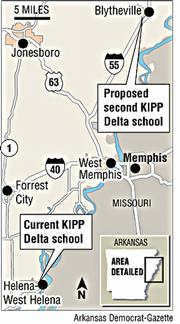LITTLE ROCK — A nationally known charter-school network hopes to expand in the Arkansas Delta by opening a new branch in Blytheville in 2010.
The impoverished Mississippi County town beat out competing bids from Pine Bluff and West Memphis for the proposed new KIPP school. KIPP, which stands for the Knowledge is Power Program, currently has an elementary, middle and high school in Helena-West Helena.
Scott Shirey, executive director of KIPP Delta Public Schools, said Wednesday that the combination of community and financial support for KIPP in Blytheville made the difference.
Blytheville's application included 60 personalized letters from parents, businessmen and community leaders and $50,000 in startup funding. There is also vacant retail space in Blytheville's downtown that seems ideal for a new school, Shirey said.
"Pine Bluff and West Memphis are two great communi-ties that are both deserving of a KIPP school," Shirey said. "Blytheville just showed a different level of commitment."
Charter schools are public schools that sign operating agreements, or charters, with the state. The Arkansas Board of Education will hold hearings on new charter applicants in November. By Monday KIPP must submit a formal application outlining its plan for Blytheville.
The three-city competition for the next proposed KIPP school was unique in Arkansas, said Mary Ann Brown, the Arkansas Department of Education's charter-school program director.
Typically, charter-school proposals in Arkansas have developed as local endeavors within specific communities.
"This is unchartered territory, so to speak," Brown said.
KIPP's national track record of successfully reaching at-risk youths makes it appealing to Delta community leaders, said Jack Poff, a leader of West Memphis' KIPP drive.
Nationwide, KIPP serves 20,000 students at 82 schools in 19 states and the District of Columbia.
"So many of these charters are startups that who knows how they'll perform," Poff said. "KIPP is a well-known product, and they're producing results. They have the ability to go into blighted areas and produce the kind of results that are necessary to move areas forward."
KIPP will have its work cut out for it in Blytheville.
Six of seven Blytheville schools are on the state's list of schools in need of improvement due to falling short of federally mandated achievement standards.
The only school not on the improvement list is a district-run charter school targeting at-risk youths.
The majority of the district's students are black and come from low-income families.
Richard Atwill, Blytheville's superintendent, did not return a call or e-mail for comment Wednesday.
KIPP prides itself on helping historically underperforming students.
At its three charter schools in Helena-West Helena, where 86 percent of students come from low-income families and 95 percent are black, KIPP students are exceeding state averages on standardized tests in a number of grades.
For example, 94 percent of KIPP's seventh-graders in Helena-West Helena scored at proficient or advanced levels on the Arkansas Benchmark Exam in math earlier this year.
That compares with 52 percent proficient or advanced in Blytheville and 70 percent statewide.
Fifth-grade scores in math and literacy were both below the state average this year in KIPP's Helena-West Helena school,however.
Shirey said that's because the students hadn't been enrolled in the program long enough. He said the pupil's test scores should rise as they progress toward high school.
Besides a reputation for strong community support and in-school discipline, longer school days are one of KIPP's hallmarks.
Students are in school from 7:30 a.m. to 5 p.m. Monday through Friday, and also attend special class sessions every other Saturday. KIPP also holds three weeks of mandatory summer school each year.
The new KIPP school in Blytheville would be led by Maisie Wright, a KIPP math and science teacher from Helena-West Helena who began her career in education as a Teach for America Corps member.
The Blytheville plan calls for starting with a class of fifth-graders next fall, and then adding a grade each year up through the eighth grade.
As they did in Helena-West Helena, Shirey would like to open elementary and high schools in Blytheville.
The new KIPP school would be an open-enrollment charter school. These schools are operated by nonprofit organizations instead of traditional school districts. Charter schools operate under the terms of a five-year renewable contract with the state board.
The state's charter schools are exempt from some of the rules that govern traditional schools, so they have more flexibility to innovate. In return, they are held more accountable for student achievement.
The schools are tuition-free and open to all students. If there are more applicants than available slots, as there are in Helena-West Helena, students are chosen randomly via a lottery.
KIPP ultimately wants to open 12 schools in four Arkansas Delta communities by 2019. The plan is to open two more KIPP schools in 2011.
Joy Blankenship, a leader of Pine Bluff's effort to woo KIPP, said her city will try to attract KIPP again then.
She said the city needs to start planning earlier, build up more grass-roots support and raise more startup money. Their unsuccessful drive this year raised interest in KIPP, Blankenship said, which should make it easier to build up support next year.
"It's like taking a test," she said. "If you don't do well the first time, you learn for the next time how to prepare."
With 12 schools in four communities, Shirey estimates KIPP will have about 3,600 students. That should add up to about 15 percent of the Delta's low-income student population.
Shirey hopes that will mark a "tipping point" to force traditional public schools in the Delta to enact educational changes that raise student achievement.
"When schools compete, students and parents win," Shirey said. "That's the bottom line."
Arkansas, Pages 9, 14 on 08/27/2009
